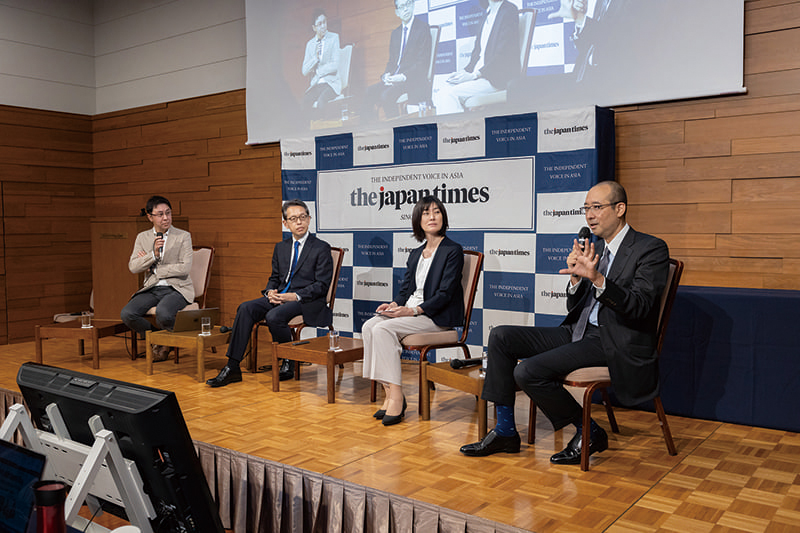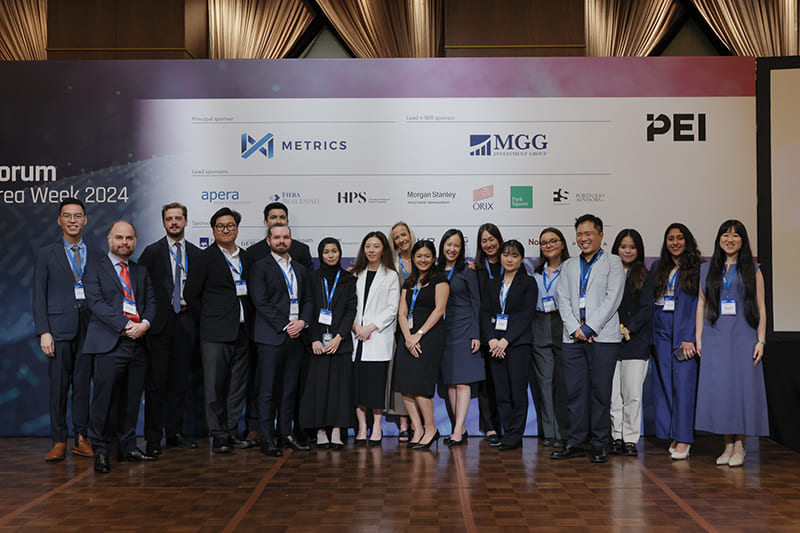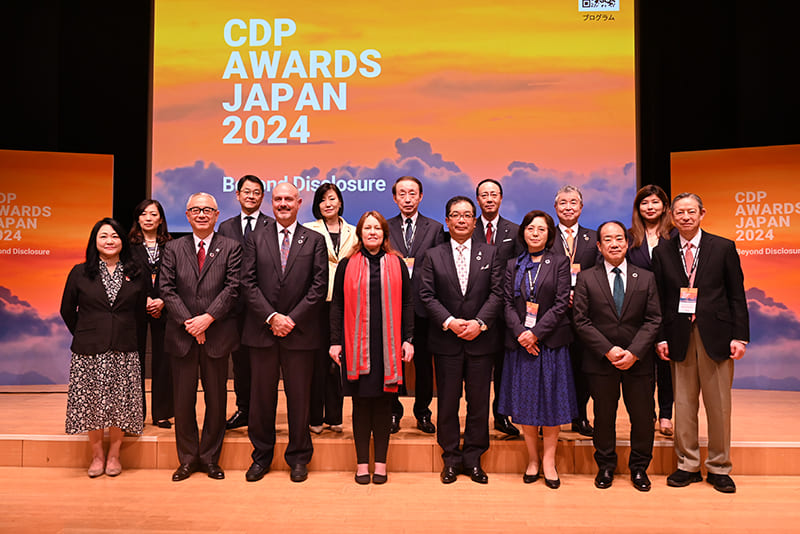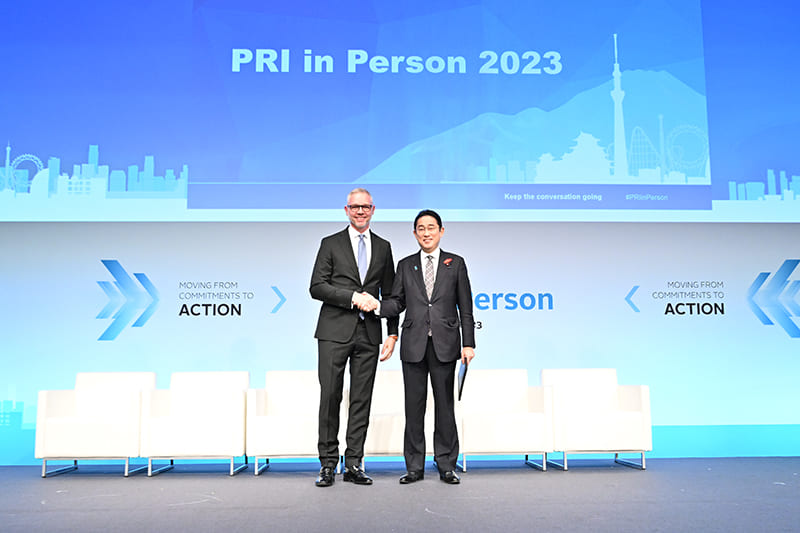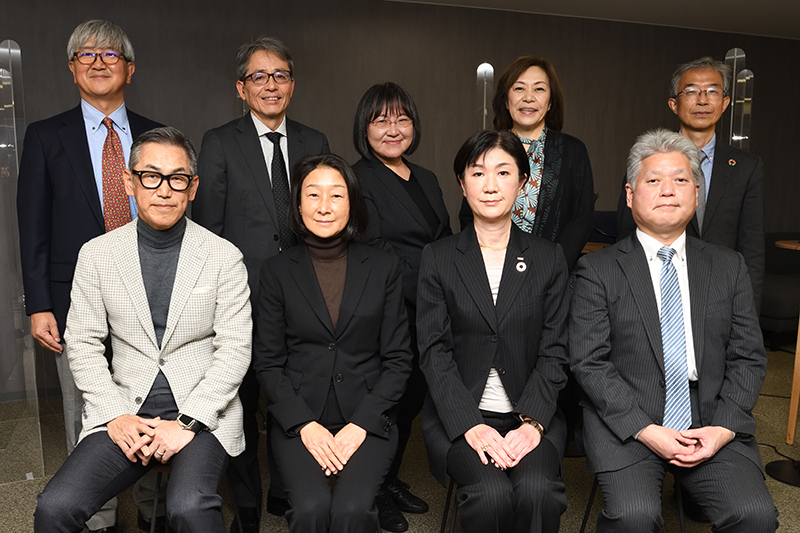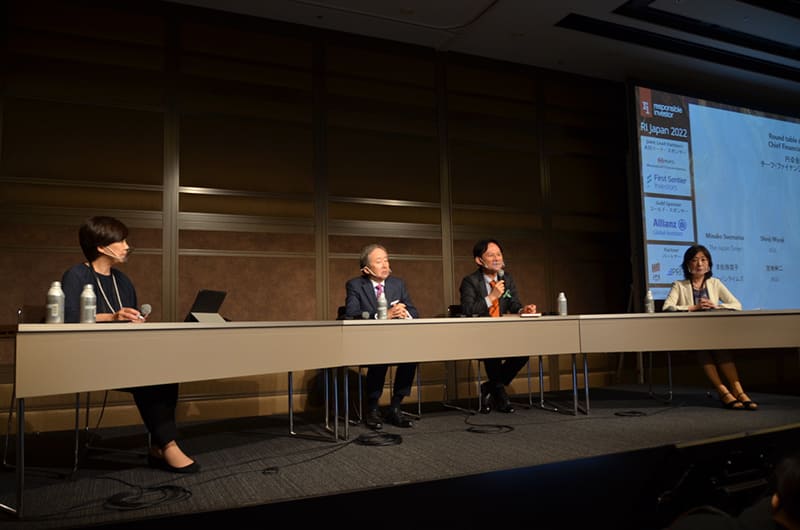October 02, 2023
‘Active’ and ‘protective’ investments for sustainability
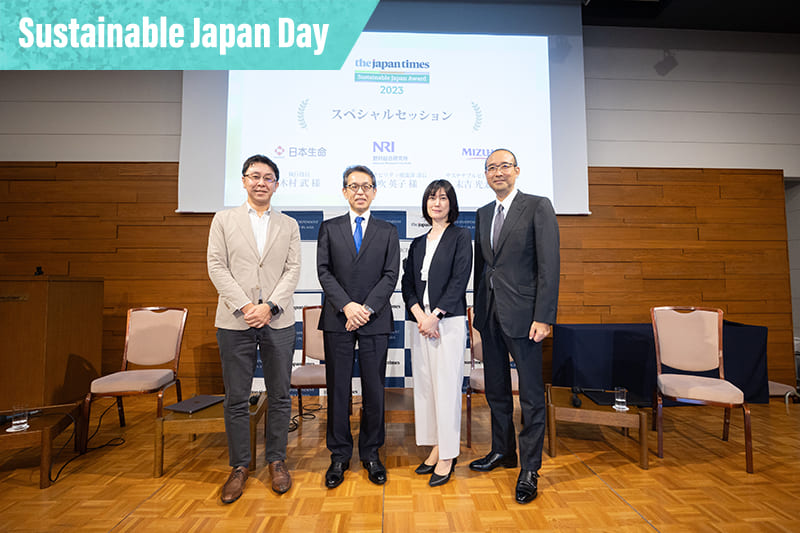

CEO, Renews Inc.
The last panel discussion focused on the changing landscape in environmental, social and governance (ESG) investment in the face of accelerating global warming that threatens people around the world.
“Responsible investment is facing a turning point for a further leap,” Takeshi Kimura, a special adviser to the board for Nippon Life Insurance Co. and one of the panelists, told the audience. Responsible investment is an approach that incorporates ESG factors into ownership policies and practices in selecting and managing investments.
Kimura said the ESG investment landscape is changing because more institutional investors are placing weight on taking an active stance, rather than a passive or protective one, in efforts to close the huge gap between corporations’ carbon emission goals and their slow actual progression.
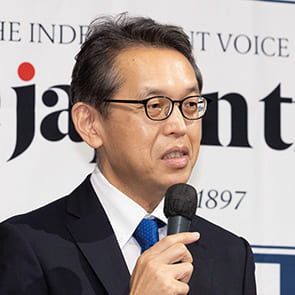
He said “protective investment” means that investors aim to minimize negative impacts on their portfolios caused by risks arising from climate change. For example, such investors decrease their investments in companies that emit large amounts of carbon dioxide because consumers and business partners will not support them or their products and services amid the intensive weather events — wildfires, droughts, torrential rains and floods — now happening all over the world. Further tightening regulations on carbon emissions would also lead to lower sales of their products and services, he added.
Meanwhile, “active investment” means taking action to change society for the future and mitigate global warming through selective investment. For example, investors urge companies emitting excessive carbon dioxide to compile schedules on reducing emissions and monitor their progress. If they fail to meet the goals, investors have dialogues with them and if necessary, take a further step to participate in proxy voting.
“Currently, institutional investors are shifting their stances from defensive investments to offensive ones,” Kimura said.
He also said the momentum is not affected by a backlash against ESG investment in some parts of the United States. Amid this anti-ESG movement, media reports said in June that BlackRock chief executive Larry Fink had stopped using the term “ESG,” saying it had become too politicized. Yet Fink, an active leader on adopting ESG standards, also said the world’s largest asset manager hadn’t changed its stance on ESG issues.
Kimura, who is also a board member of Principles for Responsible Investment (PRI), said its signatory institutions clearly had changed their stance from the one seen at its foundation in 2006. At that time, the U.N.-backed network’s signatories basically took a passive investment stance. But the latest survey showed that the situation has changed.
According to a PRI Board survey of signatory organizations conducted late last year and early this year, 63% of the 1,487 respondents believed that for them, responsible investing will in the future involve taking action on real-world outcomes in addition to managing ESG risks, clearly showing that they consider taking an active stance will be important.
At an event on Sept. 6 to discuss how to help companies achieve their ESG goals, PRI Chair Martin Skancke touched upon the changed stance in the survey. He said: “Most respondents say they see responsible investment in the future as including a combination of managing risks and identifying and acting on sustainability outcomes. This is a fundamental shift in the way our signatories are thinking about responsibility.”
Why is the landscape changing in the investment field, then? “The reason is people’s aspiration for institutional investors has been higher than before. That sums it all up,” Kimura said. “In short, we investors are required and urged more than ever by beneficiaries and clients to rethink what is ultimately the best interest for them.”
The world feels a sense of crisis amid the intensifying natural disasters caused by climate change. Kimura quoted U.N. Secretary-General Antonio Guterres, who warned in July about the unprecedented acceleration of global warming and said that the extraordinarily hot weather made him wonder if young generations can lead a happy life when they get older and retire. In his speech at the U.N. headquarters, Guterres said that “the era of global warming has ended” and “the era of global boiling has arrived.”
“We have thought gaining a financial return is the best possible interest for beneficiaries, but that is not enough anymore. It is also investors’ responsibility to create an environment so that beneficiaries can lead a happy life,” Kimura said.
The next question, he continued, is how investor institutions can respond to requests from beneficiaries and clients not only for financial returns, but social and environmental impacts. “There is only one answer for it — helping our investee companies to promote their sustainability management and keep on evolving it,” he said.
Institutional investors support their investees so that they can improve their corporate value in the long term by accumulating nonfinancial resources, including natural, social and human capital, while aiming at maximum interest for various stakeholders rather than short-term interest. At the same time, investors reflect the companies’ impacts and outcomes in their investment decisions in the capital markets and urge society to become more sustainable, he said.
Another panelist, Kotaro Sueyoshi, Joint general manager of the Sustainable Business Promotion Department at Mizuho Financial Group Inc., echoed Kimura’s opinion. He said that sustainable finance, which takes into account ESG factors of business activities or projects, is becoming the new normal in financial markets.
“Financial institutions are willing to finance companies or business that will have a major impact on the ESG issues,” he said.
In the background, financial service providers are paying closer attention to whether their financing or investments contribute to new business, as many parts of the world are experiencing big structural changes in industries, centering on sustainability issues. They also watch how global investment trends will be affected by government policies such as the Inflation Reduction Act, signed in 2022 by U.S. President Joe Biden to promote clean energy and prevent climate change; the Green New Deal, a set of U.S. policies to phase out fossil fuels and build new jobs in clean-energy industries; and Japan’s Green Transformation policy, which aims to drive a transition to a carbon-neutral society and invest public and private money worth a total of ¥150 trillion ($1 trillion) over the next decade.

General manager of the Sustainability and Responsibility Department, Nomura Research Institute Ltd.
“What is important is if the money is really effective,” said Mizuho’s Sueyoshi. “When we make financing decisions, it is becoming very important to understand whether the fund will really contribute to improvement of the environment or accumulation of various capital.”
Asked by a moderator about how to measure the impacts, Sueyoshi said, “Basically, we are still at an early stage of development.”
To help investors and other stakeholders evaluate their sustainability performance, companies are required to disclose nonfinancial data in the ESG areas to meet international standards. Some companies, but not many, have already started to disclose scenarios of future risks and opportunities caused by global climate change.
One example of such nonfinancial data is intellectual property. Others include human capital that helps to develop intellectual property, social capital that supports human capital, and natural capital, which has links with all of them, Sueyoshi explained.
Another panelist, Eiko Ibuki, general manager of the Sustainability and Responsibility Group at the Nomura Research Institute, said she was encouraged by the two institutional investors’ comments because they reaffirmed for her that companies and institutional investors are in the same boat to create a better society in the future.
“Their voices are really important to make significant changes in companies and industries in order to promote sustainable society,” Ibuki said, adding there were few such dialogues between companies and institutional investors two decades ago.
“We need to listen to investors’ voices to create a sustainable future, and it is easier now for investors and companies to go hand in hand to inspire each other,” she said.
However, Ibuki said, many companies have organizational issues to overcome.
Getting corporate structures to promote sustainability is one. “Especially, the more the expectations and demand increase, the more we realize the corporate structure is not enough to catch up with them. The more the significance of sustainability increases, the more we find that our capability is not enough either,” she said.
Also, internal cooperation and deeper understanding about ESG issues is important. Companies need to help their business sectors and departments work together to create social impacts and deepen understanding among workers at all levels about sustainability, she added.
Asked if the upcoming PRI in Person global conference on responsible investment will focus on the changes in investment trends, Nippon Life Insurance’s Kimura said the event’s title, “Moving from commitments to action,” suggests the importance of active investment.
The leading global conference on responsible investment will be held in Tokyo for the first time from Oct. 3 to 5, focusing on what investors can do to make society sustainable at a time when many industries are struggling to meet their targets for combating climate change.
The upcoming PRI in Person is the 15th annual conference by PRI. This year, Nippon Life Insurance will be the lead sponsor. Over 1,000 delegates are expected to attend, with asset owners, investment managers and policymakers discussing ESG issues and sharing the latest developments.
Kimura said that more investors who are engaged in practical operations are participating in the conference than in the past, and that the momentum for discussing practical issues is growing year by year.
Since there is no single solution for ESG issues, he continued, investors as well as corporate managers need to work on them through trial and error. “But I can say that what investors are trying to do and companies are trying to do are two sides of the same coin, and it is clear that we are heading to the same new direction together,” he said.
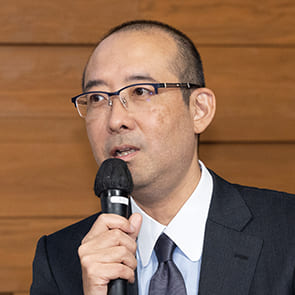
Joint general manager of the Sustainable Business Promotion Department at Mizuho Financial Group, Inc
NRI’s Ibuki echoed his comment that investors and companies need to cooperate with each other to tackle complicated social problems. “Trying to meet investors’ expectations itself leads to further growth of their business,” she said, adding that she has not seen such movement in her consulting career for Japanese corporate sustainability strategies in more than 20 years. “So, I really feel that a big change is happening right now.”
Mizuho’s Sueyoshi has also been involved in financing and investing in sustainable business for many years. Asked how financial institutions evaluate ESG-oriented businesses, he said that what financial service providers need to do first is to know more about what the businesses are aiming to do.
“Many startup companies, in particular, launched their business to solve social issues,” he said. Thus, financial institutions check their growth potential — how much they contribute to society and environment, and how exciting the business will be — and decide if they can extend loans or invest, while considering the business impacts. “They need to have the ability to assess the startups’ impact-oriented mind,” he said.
Sueyoshi said that not only some listed companies but also unlisted young ones are creating change in the investment industry because some of them don’t even have an initial public offering on their priority list. Their biggest goal is not to pursue growth, but to create a maximum impact on society.
Changes also appear in companies’ policies for employees’ well-being.
Japanese companies are more willing to take care of not only employees’ salaries but also their well-being, Kimura said. But in many cases, what those companies focus on is physical well-being — medical checkups, work-life balance and maternity leave. Compared to U.S. counterparts, what they forget about is financial well-being, he said.
In the U.S., an increasing number of companies are focusing financial well-being. It is logical for them to do so because they need to attract workers due to the “great resignation,” in which a large number of workers voluntarily quit their jobs in the wake of the COVID-19 pandemic. So companies are willing to provide various support to workers, many of whom are burdened with huge student loans, Kimura said.
Besides support for workers’ debts, it is more and more important for companies to improve employees’ financial literacy because that makes a difference in their lifelong salaries. Some U.S. financial institutions establish companies solely to provide financial education programs. For example, Morgan Stanley at Work is such a firm to help employees to achieve their financial goals.
On the other hand, in Japan, many listed companies and large companies, including Nippon Life Insurance, have never provided their employees with enough financial training programs, especially on pension funds. Due to a lack of training and information, a large part of employees allocate money for their pension funds into low-return principal-protected investments, Kimura said.
In his closing comments, Kimura stressed the importance of corporations’ role through their pension funds.
“Even if companies talk about sustainability, there are risks that they may be criticized if they don’t care about the sustainability of employees’ financial assets in their pension funds,” he said. Corporations are not only responsible for the sustainability of their mainstream business, but also the sustainability of their pension funds as institutional investors, he said, adding that he hopes it will be nothing special to think about workers’ financial well-being a few decades from now.
Ibuki said companies are required to make management decisions on what can create a sustainable society and make the company grow in the long term, even if it costs money in the short term.
Sueyoshi emphasized banks’ role in connecting investors to corporations. “It is important not only for large global companies, but whatever organizations — medium and small companies as well as startups — to present their value, increase the transparency of their outcomes and hold dialogues with stakeholders, including financial institutions. I’d like to help the companies to link with stakeholders, including investors,” he said.
